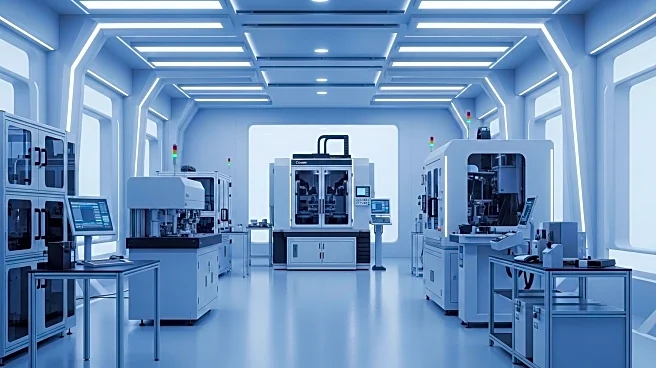What's Happening?
Pharmaceutical giant Eli Lilly & Co. has announced plans to invest $5 billion in constructing a new manufacturing facility in Goochland County, Virginia. The facility will be located at the West Creek Business Park on a 227-acre site owned by Markel. The project is part of Eli Lilly's broader $50 billion investment strategy to expand its manufacturing capabilities in the United States. The new facility will focus on producing bioconjugate and monoclonal antibody treatments for cancer and autoimmune diseases. The development is expected to create 650 permanent jobs and 1,800 temporary construction jobs. Eli Lilly CEO David Ricks and Virginia Governor Glenn Youngkin highlighted the economic benefits during a press conference.
Why It's Important?
The establishment of Eli Lilly's new facility in Goochland represents a significant boost to the local economy, diversifying Virginia's industrial landscape. The creation of hundreds of permanent and temporary jobs will provide substantial employment opportunities in the region. Additionally, the facility's focus on advanced pharmaceutical manufacturing aligns with national efforts to enhance domestic production capabilities, particularly in critical healthcare sectors. This move could strengthen the U.S. pharmaceutical industry's global competitiveness and contribute to more robust supply chains for essential medical treatments.
What's Next?
Construction activities for the facility are expected to commence in the coming weeks, with a projected timeline of approximately five years for completion, including regulatory approvals. Eli Lilly plans to expedite the process in collaboration with federal agencies like the FDA. Hiring for permanent positions is anticipated to begin within the next couple of years, with a focus on recruiting local talent. The company also plans to announce three additional U.S. manufacturing sites this year, further expanding its domestic footprint.
Beyond the Headlines
The development of the Goochland facility is part of a larger trend of pharmaceutical companies investing in U.S.-based manufacturing to mitigate risks associated with global supply chain disruptions. This strategic shift may lead to long-term changes in how pharmaceutical products are developed and distributed, potentially influencing regulatory policies and industry standards. The project also highlights the growing importance of technology-friendly zones, which could attract more tech-related industries to the region.









